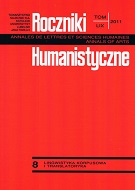Język grecki - współczesna koine w terminologii medycznej
Greek Language - Modern Koine of Medical Terminology
Author(s): Krzysztof NareckiSubject(s): Language and Literature Studies
Published by: Towarzystwo Naukowe KUL & Katolicki Uniwersytet Lubelski Jana Pawła II
Keywords: Greek language; koine dialect; Latin; etymology; history of medicine; medical terminology
Summary/Abstract: The article touches upon the issue of the provenance of the vast majority of modern medical terms (about 90-95%), used in the language of professionals (doctors, pharmacists, etc.) and in the so called professional literature. The author attempts to: (1) first, outline historical conditions of the development of medicine and its terminology, justifying the thesis formulated in the title; (2) then, in a simplified manner, indicate the rules of technical terms' formation, thus, demonstrating the dominant role of the two classical languages, Greek and Latin (with the overwhelming supremacy of the former), in the structure of the created neologisms. The history of medicine and the analysis of its language, carried out on the selected examples, lead to the following conclusions: (1) „classical” (especially ancient Greek) vocabulary is the universal key to understanding contemporary medical terminology; (2) knowledge of the vocabulary and of the rules that govern the system of creating new terms, facilitates, firstly, mastering the terminology by a medicine student, secondly, its understanding among other professionals (for instance, pharmacists, veterinary surgeons, etc.) and even „laymen” (through etymology); and finally, (3) it is possible for the translators to provide a universal (in most cases) translation by means of almost identical terms, regardless of the target language.
Journal: Roczniki Humanistyczne
- Issue Year: 59/2011
- Issue No: 08
- Page Range: 151-165
- Page Count: 15
- Language: Polish

